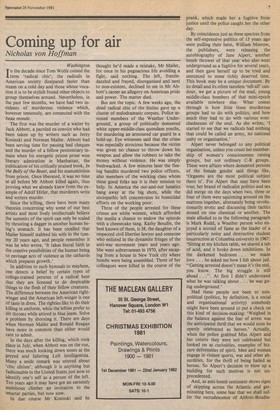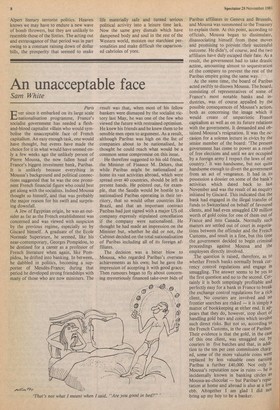Coming up for air
Nicholas von Hoffman
Washington In the decade since Tom Wolfe coined the term 'radical chic', the radicals in American society dissipated faster than steam on a cold day and those whose vocation it is to be stylish found other objects to group themselves around. Nevertheless, in the past few months, we have had two incidents of murderous violence which, however tenuously, are connected with the beau monde.
The first was the murder of a waiter by Jack Abbott, a paroled ex-convict who had been taken up by writers such as Jerzy Kosinski and Norman Mailer. Abbott had been serving time for passing bad cheques and the murder of a fellow penitentiary inmate when his energetic prison prose won literary admiration in Manhattan, the publication of his critically praised book, In the Belly of the Beast, and his manumission from prison. Once liberated, it was no time at all before Mr Abbott killed again, thus proving what we already knew from the example of Adolf Hitler, that murderers write and writers murder.
Since the killing, there have been many theories concerning why some of our best artists and most lively intellectuals believe the summits of the spirit can only be scaled by thrusting a dagger in another human being's stomach. It has been recalled that Mailer himself stabbed his wife in the tummy 20 years ago, and people remember it was he who wrote, 'It takes literal faith in the creative possibilities of the human being to envisage acts of violence as the catharsis which prepares growth.'
In addition to such hymnals to mayhem, one detects a belief by certain types of college-trained persons of a radical bent that they are licensed to do despicable things to the flesh of their fellow creatures. The difference between the American rightwinger and the American left-winger is one of taste in dress. The righties like to do their killing in uniform, while the lefties prefer to slit throats while attired in blue jeans. Solve a problem by shooting it. There are days when Norman Mailer and Ronald Reagan have more in common than either would care to admit.
In the days after the killing, which took place in July, when Abbott was on the run, there was much looking down noses at the greyed and faltering Left intelligentsia. Many a snide remark was uttered about 'chic elitism', although it is anything but fashionable in the United States just now to Identify one's self as a person of the left. Ten years ago it may have got an earnestly ambitious climber an invitation to the smarter parties, but now now.
In due course Mr Kosinski said he thought he'd made a mistake, Mr Mailer, for once in his pugnacious life avoiding a fight, said nothing. The left, frazzledazzled and frayed, disorganised and next to non-existent, declined to see in Mr Abbott's career an allegory on American pride and power. The matter died.
But not the topic. A few weeks ago, the dead radical chic of the Sixties gave up .a cluster of melodramatic corpses. Police arrested members of the Weather Underground, a group of politically demented white upper-middle-class quondam youths, for murdering an armoured car guard in a hold-up. Eye witnesses said that the crime was especially atrocious because the victim was given no chance to throw down his weapon and allow the robbers to take the money without violence. He was simply bushwacked. A few minutes later the fleeing bandits murdered two police officers, also members of the working class whom these good folks say it is their mission to help. In America the out-and-out lunatics bang away at the big shots, while the sociopathic left concentrates its homicidal efforts on the working poor.
Three of the people arrested for these crimes are white women, which afforded the media a chance to endow the episode with a cheesecake tang. Kathy Boudin, the best known of them, is 38, the daughter of a respected civil liberties lawyer and someone who enlisted in the dynamite fringes of the anti-war movement years and years ago. She went subterranean in 1970, after escaping from a house in New York city where bombs were being assembled. Three of her colleagues were killed in the course of the prank, which made her a fugitive from justice until the police caught her the other day.
By coincidence just as these spectres from the self-expressive politics of 15 years ago were pulling their heist, William Morrow, the publishers, were releasing the autobiography of Jane Alpert, another bomb thrower of that year who also went underground as a fugitive for several years, and then gave herself up to be tried and sentenced to some richly deserved time.
This book may be a unique document. By its detail and its often tasteless 'tell-all' can dour, we get a picture of the mad, young middle-class bombers of that mini-epoch available nowhere else. What comes through is how little these murderous groups had to do with politics, and how much they had to do with various wret chednesses of the soul. As she writes, 'I started to see that we radicals had nothing that could be called an army, no national unity or organisation.'
Alpert never belonged to any political organisation, unless you count her membership of women's consciousness raising groups, but not ordinary C-R groups. These were affairs where demented persons of the female gender said things like, 'Orgasms are the most political subject there is'. For Alpert that may have been true; her brand of radicalist politics and sex did merge on the days when two, three or four of them were squirming around on the mattress together, alternately being revolu tionarily erotic and discussing their tactics stoned on one chemical or another. The male alluded to in the following paragraph is Mark Rudd, a Weather person who enjoyed a second of fame as the leader of a particularly noisy and destructive student insurrection at Columbia university in 1967: 'Sitting at my kitchen table, we shared a tab of acid, and it broke down inhibitions. In the darkened bedroom . . . we made love . . . he asked me how I felt about jail.
"Getting arrested doesn't mean it's the end, you know. The big struggle is still ahead . . .". At first I didn't understand what he was talking about . . . he was going underground.'
Had these people not been so nonpolitical (politics, by definition, is a social and organisational activity) somebody might have been around to put a check on this kind of decision-making: 'Weighed in the balance against the fear of arrest was the anticipated thrill that we would soon be openly celebrated as heroes.' Actually, when the police grabbed Miss Alpert and her coterie they were not celebrated but looked on as curiosities, examples of biz zare deformities of spirit. Men and women engage in violent sports, war and other absurdities, for the thrill of being hailed as heroes. So Alpert's decision to blow up a building for such motives is not unprecedented.
And, as anti-bomb sentiment shows signs of skipping across the Atlantic and ger minating here, some fear that we shall suffer the recrudescence of Abbott-Boudin Alpert literary terrorist politics. Heaven knows we may have to endure a new wave of bomb throwers, but they are unlikely to resemble those of the Sixties. The acting out and extravagance of that period was in part owing to a constant raining down of dollar bills, the prosperity that seemed to make life materially safe and turned serious political activity into a leisure time lark. Now the same grey dismals which have dampened body and soul in the rest of the Western world, moisten our starchiest personalities and make difficult the caparisoned cabrioles of yore.















































 Previous page
Previous page